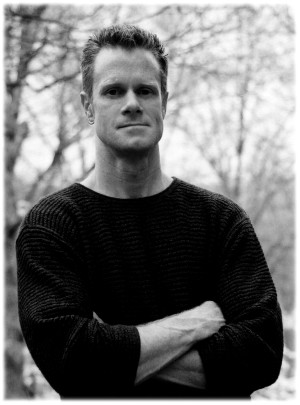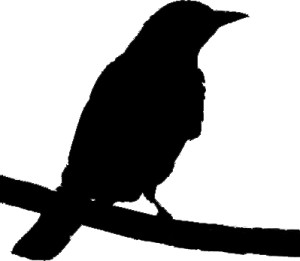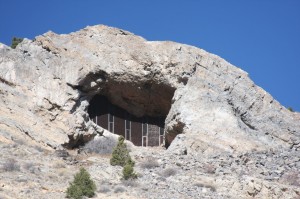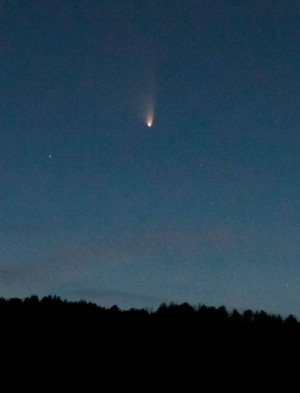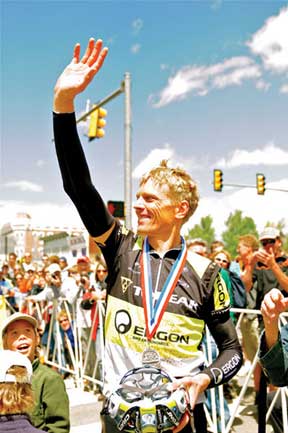by Robb Cadwell
It was the first day of the season, and two high school buddies hiked up to the top of a rock with a good view to glass the small high flats below them.
In his fifties and long past high school age, Ben had been hunting the area for 30 years. He not only knew every patch of public and private land but had permission to hunt from quite a few of the landowners. His buddy Dan, having survived a heart attack and divorce, was on his second trip out to Colorado with a cow elk tag in his pocket and a friend for a guide who was a magician at finding elk. People pay tens of thousands of dollars for a similar experience. Dan had it all for the price of an out-of-state license.
They lay on that rock for an hour, squinting into the binoculars, looking into every edge of clearing, trying to see down between the trees. The herd of sixty elk had been in that meadow at sunset but now was nowhere to be seen. To rest his eyes, Ben turned his glasses to the rooftops and driveways of people he knew. The wildlife biologists long ago gone to work, the out-of-staters with the driveway plowed but untracked, the retired bar owner with smoke coming from her chimney and sixty head of elk lazing on the open hill behind her house.
They called the retired bar owner on their way over. Ben just happened to have her number on his phone.
But when they got there … no elk. They had retreated from the now sunny hillside and were nowhere to be seen. With no way to track them across someone else’s land, Ben and Dan drove around to a piece of Forest Service land in the direction the elk were headed, then spent all day walking in and waiting for the arrival that never happened.
In the now long shadows of late afternoon, they again checked the retired woman’s hillside – there were the elk, as if they had never left.
Ben and Dan coasted into the driveway and gently shut the doors of the truck. Elk are funny when on their winter range in a large herd. They are affected by what’s called “the selfish herd.” Despite the presence of two of the deadliest predators on the planet, the chances of any one individual elk being selected and preyed upon by these humans was very low.
Ben had a bull tag.
It’s not as easy as it might sound to shoot an elk in a herd at 80 yards. You can only shoot one – no pass- through and hit another, no ricochet and hit another. You can’t just shoot the elk, or even just kill the elk, you have to shoot so the meat is saved and the animal dies as quickly as possible. Some might look for the largest bull. Ben looked for the very easiest legal bull to shoot. You might get only a few seconds in which to make a good shot. A herd that runs away right in front of you is only good for stories. He shot one and it dropped to the ground.
Ben uses a 300 Weatherby for everything. It has a tremendous kick, and he doesn’t need that much gun, but it’s what he has so he uses it.
The elk were moving but not in flight, more like a churning. Dan fired and Ben swears he saw the cow go down, but he lost track of it with the large herd now stomping and running off.
After the herd disappeared, Ben and Dan were left with a bunch of trampled snow and a 4×4 raghorn bull dead on the ground. They went to where Ben thought he saw the cow go down, looking for blood on the snow. None.
They walked slowly in ever-larger circles, bent at the waist, then back and forth, crisscrossing the herd’s path. Both stared at the ground, never walking further than five feet from their last path across the track of the elk herd. They would have seen one drop of blood.
Ben has an uncanny eye for things. He notices subtle differences in tracks – the “shine” to the one laid down in the afternoon, compared to the “rough” of the one that morning when the tiny soil particles begin to dry and stand up. After a half hour with the headlamps, they winched the bull onto the truck, drove it over to Ben’s land, gutted it and drove home.
I’ve seen plenty of people miss closer shots, even braced across the hood of a warm pickup. Eighty yards isn’t so close when a cow must stand still for three seconds – time enough to squeeze off one shot and place it through both lungs.
In the morning they took the bull down to the processor in town and then hunted that piece of Forest Service land in the afternoon. The next day they glassed in the early morning, then went to the bar owner’s house to make a gift of some backstrap. As soon as they pulled in the drive, they saw the ravens.
The cow had piled up beside one big old Juniper with large boulders around it, branches almost to the ground. It was not sixty feet from where Ben had seen it go down, right in the middle of the opening. Its gray rounded back looked exactly like the adjacent boulders, head and feet toward the trunk, hidden by tall grass. They had walked within ten feet of it while searching the ground.
Elk sometimes leave no blood trail. A shot can pass through both lungs and out the other side, filling the body cavity with blood. Sometimes the winter hair coat is thick and very tightly matted. The hide is tough and thick too; under it is a thick layer of fat.
It was a mess. Something big had gotten to it, probably bigger than coyotes, though they had no doubt helped. The two quarters on top were half-gone and picked over by ravens, guts all around. There was no salvageable meat.
Dan affixed his tag to the carcass. Then they rolled the carcass onto a tarp, attached a rope to the neck of the cow, pulled the whole mess onto a piece of plywood and winched it up onto the bed of the pickup. They drove it over to Ben’s land and dumped it there to feed a different set of coyotes.
Ben then called and left a message with the local Fish and Game officer, explaining what had happened. Wasting meat is a felony. The two men had acted in good faith, but it’s the kind of thing you really should tell someone about. Everyone knows everyone, and there is plenty of mutual respect flowing both ways. I’m sure nothing will come of it – it’s just one of those things you wish hadn’t happened.
Robb Cadwell lives with his wife and two young children in a small mining town north of Denver surrounded by endless sprawl. Besides spending time with his family outdoors and cooking Laotian food using wild ingredients, Robb pursues his lifetime goal of growing older.

